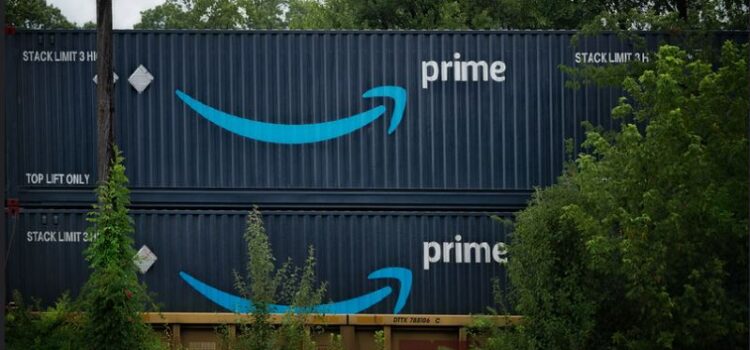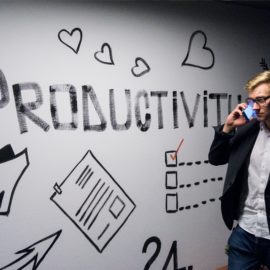
Why is Amazon so successful? How does Amazon set itself apart from other businesses?
When Amazon made over $100 billion in sales in a single year for the first time, Jeff Bezos reported that it’d achieved that volume faster than any other business. In Invent and Wander, Bezos attributes Amazon’s success to its workers and to the company’s culture.
Continue reading to learn more about the cornerstones of Amazon’s success.
1. It’s All About the Customers
Why is Amazon so successful? From the start, Bezos declared his intention that Amazon should be the most customer-friendly business in the world. In practice, that means putting customers first is the guideline for every business decision. Bezos describes his deep respect for Amazon’s customers, how their needs drive the business to constantly improve, and how customer focus dictates Amazon’s expansion into new territories and markets.
Bezos starts from the assumption that customers are intelligent—they know the difference between good and bad service, and they can see through any flimsy marketing campaign that might try to brush away a company’s faults. Therefore, the only way to build a good brand is to always give customers a positive experience. No matter the customer, there are always certain constants—people like having a variety of options, paying less for them, and receiving what they order quickly. These constants demand that Amazon’s team meet high expectations in everything they do and teach those expectations to every new employee.
(Shortform note: Bezos’s chief marketing strategy isn’t focused on selling specific items to customers as much as selling the “Amazon experience.” In Superfans, Pat Flynn describes this strategy in detail, arguing that the quality of your customers’ experience is more important than how many customers you have. Once customers become “superfans” of a service, it becomes part of their identity that’s embedded in their daily routines. These customers become active marketers for your company, provide your business with vital feedback, and can ensure your company’s overall longevity. The steps for turning customers into fans boil down to the essentials of good customer service—establish a connection and provide something of value.)
Always Doing More
Amazon pushes to never stop improving because customer expectations always go up. Bezos argues that striving to keep up with its customers rather than aiming to beat the competition forces Amazon to keep innovating even in markets where it already has a commanding lead. Some companies focus on doing one thing and doing it well, but that can give a business tunnel vision. By placing themselves in their customers’ shoes, Amazon’s teams must constantly learn new areas of expertise, which then branch out into whole new markets and services that customers will enjoy. Expanding into new markets is key to keeping Amazon’s customers happy as well as bringing more into the Amazon fold.
(Shortform note: Bezos’s continual expansion of Amazon’s services and the markets in which it operates is a strategy that many companies employ as a bulwark against financial downturns and organizational stagnation. In The 10X Rule, Grant Cardone cites the examples of companies like Google, Walmart, and Coca-Cola who work to make themselves omnipresent so that virtually no one is unaware of their existence. By constantly expanding—and in a sense, overcommitting their resources—companies are forced to excel and innovate in order to survive and deliver on their promises. The end result is a business that can weather any economic downturn, because staying competitive is baked into its culture.)
Other ways Amazon draws in new customers, as well as building trust with those it has, include some practices that seem counterintuitive—such as letting customers post negative product reviews, displaying third-party products that may be cheaper than its own, and proactively informing customers when they could get a better deal than what they’re currently paying. While each of these practices results in a short-term revenue loss, their cumulative impact is an increase in customer loyalty, positive brand associations, and more future sales.
(Shortform note: While it’s true that companies require short-term revenue to pay their bills and keep the lights on, fixating on short-term profits can blind a business to more important issues. In Zero to One, Peter Thiel argues that entrepreneurs should grow their businesses based on 10- or 20-year projections, even though short-term targets are easier to set and measure. In Drive, Daniel H. Pink points out that emphasizing short-term profits leads to short-term thinking, showing that companies that obsess over quarterly earnings spend less on research and development—boosting their short-term numbers at the expense of long-term viability.)
2. Taking the Long View
To maintain Amazon’s market leadership, Bezos and the rest of his leadership team focus on the company’s success in the future, not on its current quarterly statements. Bezos explains his insistence on making decisions that pay out in the long run, how this reflects an “ownership” mindset, and why many of his long-term decisions are, by necessity, judgment calls.
As early as Bezos’s first letter to shareholders in 1997, he warned investors that Amazon would often engage in practices that incurred short-term losses. The point was to quickly take a lead in the market, which could only be done by building Amazon’s brand, growing its number of repeat, loyal customers, and encouraging more and more sales through its site. He acknowledged that for purely technical reasons, online shopping in the ’90s was still frustrating, so Amazon made up for that by reducing prices and increasing its selection. Nevertheless, the company had to be careful when cutting prices to minimize its losses as it grew.
Bezos says that Amazon executives spend more time setting customer service goals than they do poring over financial reports, because creating value for customers results in greater business returns over the long haul. Short-term speculators don’t appreciate this mindset, but Bezos believes that good investors think like owners and should therefore be on the same wavelength regarding Amazon’s long-term ambitions.
3. The Will to Innovate
The biggest gambles requiring the most judgment revolve around some form of innovation. Bezos places innovation at the core of Amazon’s identity and culture. He explains innovation’s crucial role in keeping Amazon fresh and energized, how innovation is driven by both customer needs and industrial trends, and why failure is an acceptable, necessary cost.
Bezos’s central business philosophy is that no matter how established your company is, you should always act as if it’s a startup. The alternative is complacency and stagnation, whereas a startup mentality brings energy and a gung-ho attitude to stay ahead. This doesn’t just apply to the boss, but to every employee, because the next innovative insight could come from anywhere in the organization. For example, Bezos writes that Amazon Prime, which paid for itself by the sheer volume of business it generated, was first suggested by a low-level programmer. For this reason, all employees must be empowered to think for themselves and come up with risky ideas. If not, they may quit and innovate for your competitors instead.
When innovating, Bezos says that it’s important to keep ahead of sweeping industry trends, such as the development of artificial intelligence, but it’s equally important to be so aware of customers’ needs that you can guess what they want before they know it. This involves a process that Bezos calls “wandering”—inventing new products and services with only a vague notion of whether they’ll be successful. This process of trial and error isn’t as haphazard as it sounds, but it’s driven by Amazon’s employees’ insights about how customers engage with the world and what potential innovations might create opportunities for Amazon and its users.
4. Looking to the Future
Amazon’s success has made Bezos one of the richest people on the planet, but his ambitions don’t end there. Bezos wants to use his wealth to be a positive force for change in the world. He discusses his thoughts about the social responsibilities of big business and how he’s using Amazon and his aerospace company Blue Origin to improve climate conditions on Earth while laying the foundation for future space-based endeavors.
Industry giants like Amazon are often disparaged for their success, which Bezos argues isn’t helpful or fair. Because of its scale, Amazon can have a positive impact on the world in ways that individuals and nonprofits simply can’t. One way that Amazon has sought to fulfill its responsibilities to society is by raising its wages above the minimum required and challenging other businesses to follow suit. Beyond that, Amazon offers paid tuition for employees pursuing advanced education, while extending paid leave to employees’ family members whose own jobs may not provide the same. In addition to setting an example for other companies, Bezos writes that such policies are good for the recruitment and retention of dedicated workers.
Amazon’s industry leadership extends into environmental issues. Bezos prides himself that Amazon was the first business to sign the 2019 Climate Pledge, despite the fact that its reliance on packaging and shipping makes it a carbon-intensive industry. To meet its climate goals, Amazon designed one of the world’s most complex systems to track and reduce its carbon emissions. In addition, Amazon’s internal goal is to be carbon neutral by 2040, investing in renewable energy and a fleet of electric delivery vehicles. If it can achieve this, Amazon can pressure others to meet the same standards and even supply the technology to do so.

———End of Preview———
Like what you just read? Read the rest of the world's best book summary and analysis of Jeff Bezos's "Invent and Wander" at Shortform.
Here's what you'll find in our full Invent and Wander summary:
- A compilation of Jeff Bezos’s letters to Amazon shareholders, interviews, and speeches
- How Amazon rose from a niche retailer to a digital superstore
- Bezos’s values and insights into innovation and success





